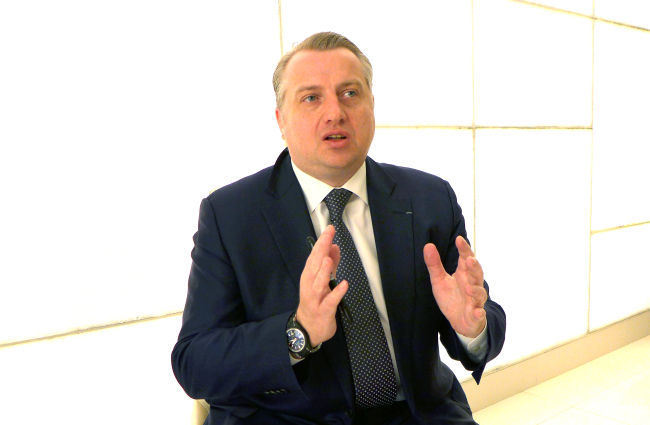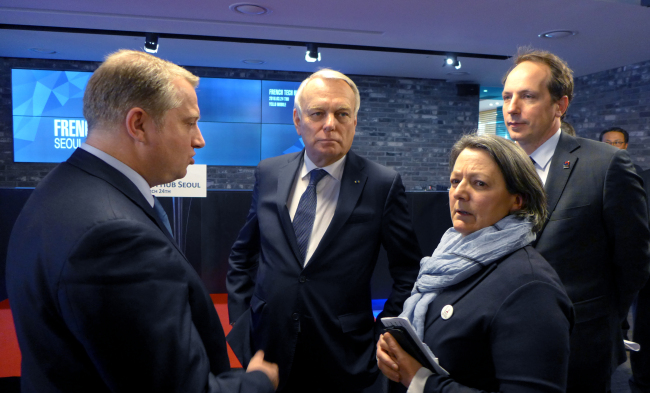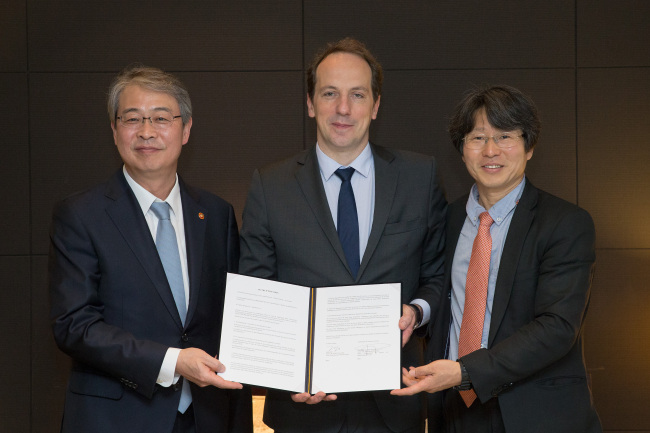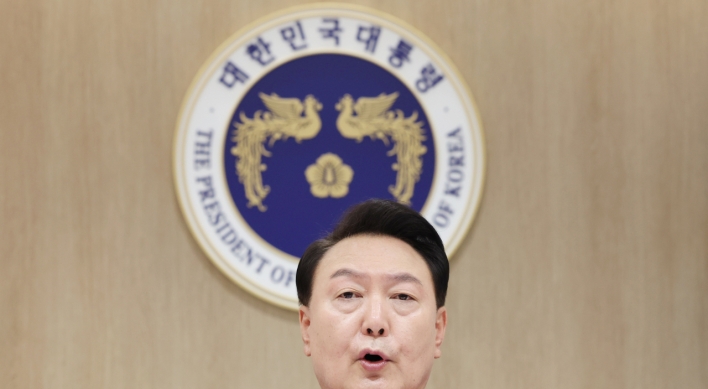[HERALD INTERVIEW] ‘France, Korea are sound partners in Internet of Things’
“Our key challenge is how to connect manufacturing and services industries,” the chairman of the French Korean Chamber of Commerce and Industry told The Korea Herald
By Korea HeraldPublished : March 13, 2017 - 18:07
As an imaginative entrepreneur, David-Pierre Jalicon envisions our future homes embedded with Internet of Things technologies micromanaging every aspect of our lives.
In the upcoming Fourth Industrial Revolution, he says, “things will be more integrated and interconnected” through industrial convergence. As all disciplines, economies and industries become fused and physical, digital and biological boundaries become blurred, “our key challenge is how to connect manufacturing and services industries,” the chairman of the French Korean Chamber of Commerce and Industry told The Korea Herald last week.
“This is where France and Korea can cooperate together, as France is strong in both manufacturing and services, and Korea is strong in manufacturing and technology. We can harmonize our strengths to have balanced industries in our economies.”
In the upcoming Fourth Industrial Revolution, he says, “things will be more integrated and interconnected” through industrial convergence. As all disciplines, economies and industries become fused and physical, digital and biological boundaries become blurred, “our key challenge is how to connect manufacturing and services industries,” the chairman of the French Korean Chamber of Commerce and Industry told The Korea Herald last week.
“This is where France and Korea can cooperate together, as France is strong in both manufacturing and services, and Korea is strong in manufacturing and technology. We can harmonize our strengths to have balanced industries in our economies.”

Having lived and worked in Korea for over 20 years, Jalicon is also the CEO of D.P.J. & Partners, a firm specializing in architecture, engineering, interior and retail. He came to Korea in 1996 as a consultant working on the TGV high-speed train.
Compared to the finance and services-oriented British economy and manufacturing-strong German economy, the French economy is strong in both areas, he said. With startup incubators and research centers spread across the country, France is a leader in innovation, particularly in the Internet of Things technologies, as well as the services comprising legal consulting, finance, software development and hospitality, according to Jalicon.
“Both France and Korea have a lot of innovation and creativity, but Korea still has room to develop its services sector,” he said, suggesting French software and Korean hardware development be harmonized.
In the new age of industrial revolution, the volume of investment and the breadth of technology are so large that often one country cannot invest alone, he explained. “There will be a need for global cooperation in innovation investment.”
Areas for further cooperation lie in the Internet of Things, information communications technology, health care and biomedical, urban farming, smart agriculture, agri-food, waste management and renewable energy, according to Jalicon.

He also highlighted France’s expertise in managing renewable energy through the smart grid, noting future energy will be diversified, balanced and optimized through digital management.
To help the more than 193 French companies operating in Korea, potential investors and government officials, the chamber recently launched its website (www.franceinkorea21.com), which provides up-to-date information about French firms here.
“It’s about having harmonized communication,” he described, adding the website offers an integrated service using geographical information. The value of French direct investment in Korea is about $3.5 billion and French companies employ some 24,000 people here. There are more than 30 joint ventures, 15 joint research projects and numerous global sales agreements between the two.
French enterprises made their presence in Korea after the 1950-53 Korean War. Many large French corporations began entering the Korean market in the 1980s undertaking mergers and acquisitions and establishing joint ventures. Since 2008, a large number of small and medium-sized enterprises have joined the bandwagon.
Overall, they operate in aerospace and airplane production, chemicals and cosmetics, electronics components, luxury goods, furniture and furnishing, pharmaceuticals and agri-food.

“I have faith in the Korean economy, having witnessed the country rise up from the 1997 IMF financial crisis,” he stressed. “Korea has the capacity to rebound after a crisis. I’m optimistic about the future of the Korean economy.”
Regarding the potential impact of Brexit, through which Britain will leave the European Union, including the single market, Jalicon said “we regret the decision of the UK to leave EU, but it could present opportunities for foreign companies to relocate their offices and production facilities to Europe and France.”
Mentioning the Ile-de-France region that surrounds Paris, he noted it has a vibrant startup ecosystem equipped with incubators and infrastructures. Since 2012, the French government has adopted policies targeting the creation of 71 innovation clusters, ultrahigh-speed online networks, crowdfunding sources and venture capital funding mechanisms worth over $535 million across the country.
“The situation in France is much better than it looks from outside,” he said, adding much efforts have been made to deregulate the labor market and various incentives are offered to foreign investors. “There are more administrative and labor flexibilities as a result. We are taking one step at a time to generate growth, targeting 1.5 percent gross domestic growth this year.”
By Joel Lee (joel@heraldcorp.com)
-
Articles by Korea Herald











![[KH Explains] How should Korea adjust its trade defenses against Chinese EVs?](http://res.heraldm.com/phpwas/restmb_idxmake.php?idx=644&simg=/content/image/2024/04/15/20240415050562_0.jpg&u=20240415144419)







